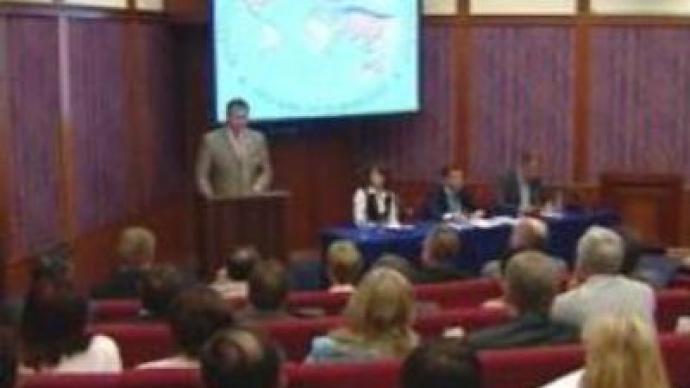Russian language abroad debated in Moscow

A conference on the status of the Russian language has taken place in Moscow. Delegates from the former Soviet Union and from non-CIS countries gathered to address issues of the Russian language media, and education abroad.
Russian is one of the six official languages of the UN. However, its status in the former Soviet republics has deteriorated. Some give it an official status and others regard it as the language of a national minority, or treat it as a foreign language. “We know about the restrictions that exist in certain countries. Status of the Russian Language has become one of the major problems,” stated Sergey Lavrov, Russia’s Foreign Minister. Around 30% of Ukraine's population are ethnic Russians. Russian is considered here a language of minority. Ukraine ratified the European Charter, the aim of which is to promote and protect historical regional and minority languages in the countries. Although many from the Ukrainian side said Ukraine does not follow the Charter. «96% of Odessa’s population consider Russian their mother tongue, we now have less than 20% of schools that educate in Russian. We want to do everything possible to make the schools at least bi-lingual,» said Valery Kaurov, Ukraine’s representative at the conference. A number of Ukraine's regions are sometimes called Russian because of the population. Region of Crimea is a vivid example. However, in the city of Sevastopol, where Russians present a dominating majority, there is only one hour of the TV broadcasting in Russian. Latvia is the only country of the former USSR where Russian is a foreign language, although 30% of the country’s population are ethnic Russians.“If I compare the language to water, then we live in a desert. Certainly the Russian government helps with literature, special courses, there is support, but, unfortunately, this is not enough, as there are governments who are not interested in keeping the language, and the status of the Russian language is used as a political instrument,” said Yury Sokolovsky, a member of Latvian parliament. One of the ways to promote the language and Russian culture is through special centres. In Georgia it is the International Cultural Union “Russian Club”.“In Georgia there is a high demand to study Russian, and this demand exceeds the offer,” noted Nikolay Svetitsky, the Club’s President.In Georgia just over 1% of the population is Russian, however, 5% of students receive their education in Russian and have an opportunity to study in Russian schools.“I think you should speak your closest neighbour’s language, even it is your enemy’s language. Russia is our friend and it has always been, and there are bad people in every nationality,” Rezo Doborjginidze, a Georgian pensioner. To promote Russian among non-CIS states is far more difficult. Sorbonne, or the University of Paris, is one of a few places in France that provides the possibility to specialise in Russian. But the interest has decreased tremendously since the collapse of the USSR.“A good perspective would have been to heat up the interests of the students studying in the so-called prestige school, which is preparing for the business elite. In this case the interest might be increased through business contacts,” noted Yaroslav Bogdanov, a professor from Sorbonne. After the collapse the Soviet Union broke up into independent states united by common history and the Russian language. The participants of the forum said when promoting the Russian language Russia should take a modern pragmatic stance, based on profit. If for the older generation Russian is the language of communication, then for the younger generation it is likely to become a language of business and co-operation.
You can share this story on social media:












